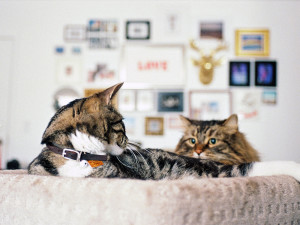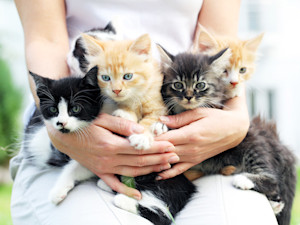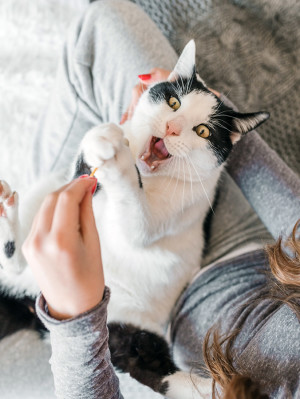Do Cats Know Their Names?
Maybe they’re just pretending not to...

Share Article
In This Article:
Can Cats Recognize Their Names? Is My Cat Ignoring Me? Can You Change a Cat’s Name? How To Teach Your Cat Their Name
You call your cat. Nothing happens. They must not recognize or remember their name, right? Can cats even understand words? That’s what we’re discussing in this article — not just whether they know their names, but why they may not be responding (or at least, not in a way you can identify) and how you can encourage the response you want.
Can cats recognize their names?
Cats may not truly understand the meaning of a word, like their name. My cat doesn’t understand that “Ollie” is his name, and that a name is a title given to something as an identifier. But he has learned to respond when he hears his name.

It’s all about connections. Animals learn through sensory input and associations. They’re connecting a word, tone of voice, volume, etc., to what’s happening in their environment and directly to them at that moment. In fact, a study from 2024 suggests that cats learn picture-word association even faster than toddlers.
Here’s another example. There have been bunnies in my yard for the last couple of months. How long do you think it took my cat to learn that when he hears me say, “Bunnies!” he should sprint to the window? Maybe a week. That’s because I said “Bunnies,” when he was looking at bunnies, often enough that he made a connection between the word and getting to stalk this little critter through the window. (Yeah, I really like the bunnies, so I yell enthusiastically every time I see them). He doesn’t know the definition of the word. But he certainly recognizes and responds to it. It’s the same with a cat’s name.
Cats can even learn to recognize each other’s names. Check out our article on that fun topic.
Is my cat ignoring me?
Time to put on your cat goggles. You can’t analyze their behavior from a human perspective, with human expectations. You need to think like a feline.
Your inclination may be to look at someone or walk over to them when called. Your cat may not have that same reaction, especially if you’ve never given them a reason to respond that way. But that doesn’t mean they don’t recognize and respond to their name in their way.
Watch closely. You may see their ears turn in your direction. They may turn and face you, or their t ail position may shift. Maybe they stop momentarily to see if anything important will follow their name, like a treat or verbal cue.
What they do when they hear those words depends greatly on what you’ve traditionally done after saying them. Do you give your cat lots of love and praise when called, or do you lecture them on the virtues of keeping the litter in the bleeping litter box? One of those is much more likely to teach your cat that coming when called is a really good idea.
Here are some other things that can impact your cat’s response to their name.
Their name is too complicated.
Simple is better when it comes to helping your cat learn and respond to verbal cues like their name. If you love the idea of naming your cat Mr. Scruffy Fluffington, Earl of Cuddletown, that’s OK. But maybe come up with a shorter nickname, and save the full title for formal occasions.
Their name isn’t associated with positive reinforcement.
This goes back to the idea of connections or associations. If you call your cat, they look at you, and throw a little party for them, they learn that responding to their name makes good things happen. They’re more likely to start running in your direction to get more of that good stuff.
On the other hand, if calling their name is followed by nothing particularly exciting or, worse yet, punishment, they will probably keep their distance and have less of a reaction.
You are using an intimidating tone or volume.
It’s not just about the word. Cats also learn that the various tones you use predict different outcomes. Calling your cat’s name for treats gets a very different reaction if you yell it like you just stubbed your toe. They’re responding to tone and volume.
They don’t recognize your voice.
Studies have suggestedopens in new tab that cats can recognize voices and appear to respond more consistently to familiar voices. If your cat is new to the family, they may need a little time to get used to your voice and start associating it with positive things, like affection and mealtime.
Can you change a cat’s name?
Sure, you can change your cat’s name, whether they’ve had it for a day or a couple of years. Cat names are often changed after adoption. And they learn to respond to the many nicknames we come up with over the years. So, if you’ve got a new cat learning their first name, an old cat learning a new name, or a cat who just isn’t responding to their name, the process is the same. (Excuse the unintended rhyme.)
How to teach your cat their name
It’s not so much about teaching them what their name is. It’s more about helping them make connections with their name, showing them what happens when you say it.
If you want to set aside time to work on this, you certainly can.
Get close to your cat.
Say their name.
Then throw a party. You can offer treats, pets, verbal praise, and play. You’re showing your cat that hearing that word means good things happen for them. They’re going to respond positively in the future when they hear it.
Repeat until you or your cat lose interest.
It will take multiple sessions, but you’ll start to see your cat responding right away when you say their name, even before the good things happen. They’re anticipating good stuff because they’ve heard their name. So, they have a good reason to respond.
You can also do this as part of your daily life. It doesn’t have to be dedicated sessions. Randomly, when your cat is around throughout the day, say their name and pile on the rewards.
You don’t have to stop at name recognition. You can teach your cat to face you and sit down, or any other behaviors, when they hear their name. It just takes a little training, and you must settle on one clear behavior to train.
It’s very helpful to avoid using their name in negative situations. For example, if your cat is scratching the couch and you aggressively yell, “Mr. Scruffy Fluffington! Stop that!” you’re teaching them that bad things happen when they hear their name.
That’s why you don’t want to name your cat a word or phrase you also use in unpleasant situations, like “Ouch,” or colorful expletives. (Don’t laugh. It happens.)
Bottom line
Your cat will respond positively to their name as long as you show them they get good stuff when they do.
It’s fine to change your cat’s name, though it may take a little time to learn the new name. Be patient.
Cats also respond to tone and volume as a predictor of what happens next. Using a light, positive tone and reasonable volume will continue to encourage your cat to respond when called.
References
Team, Enviroliteracy. “Do Animals Think in a Language? - the Environmental Literacy Council.” The Environmental Literacy Council, 16 Mar. 2025, enviroliteracy.org/animals/do-animals-think-in-a-language/opens in new tab. Accessed 20 May 2025.

LeeAnna Buis, CFTBS, FFCP
LeeAnna Buis has adored cats her entire life and thought she knew them inside out and sideways. But it wasn’t until she worked with a feline behavior consultant that she fully understood how incredible, complicated, and inspiring they really are. She made a career change, starting the certification process to become a behavior consultant right away. She discovered what unique, fascinating, complex creatures cats are and knew this was what she wanted to do with her life — help others on a similar journey to truly knowing, loving, and appreciating their cats.
LeeAnna earned her certification through Animal Behavior Institute, where she received the certified feline training and behavior specialist (CFTBS) designation.
Related articles
![Young Woman With Tattoos Holds Cat In Home While Sitting In Chair.]()
A Guide to Naming Your Cat
How to christen your cat with an ingenious name (and IG handle).
![Cat looking at laptop with woman at home.]()
Cats Associate Words With Images Faster Than Babies, New Study Finds
More proof that your cat is paying attention.
![Woman holding kittens in her arms outside.]()
The Top 20 Trending Cat Names of 2025
Classic characters like Gatsby and Zoro are back in the spotlight.
![Orange and white cat wagging it's tail at home.]()
What Does it Mean When a Cat Wags Their Tail? Guide to Cat Tail Language
And what does each type of wag mean about your cat’s mood?
![a cat making an excited face at a person's hand]()
Your Cat Can Make Nearly 300 Unique Facial Expressions, Study Finds
They’re not so mysterious after all.







